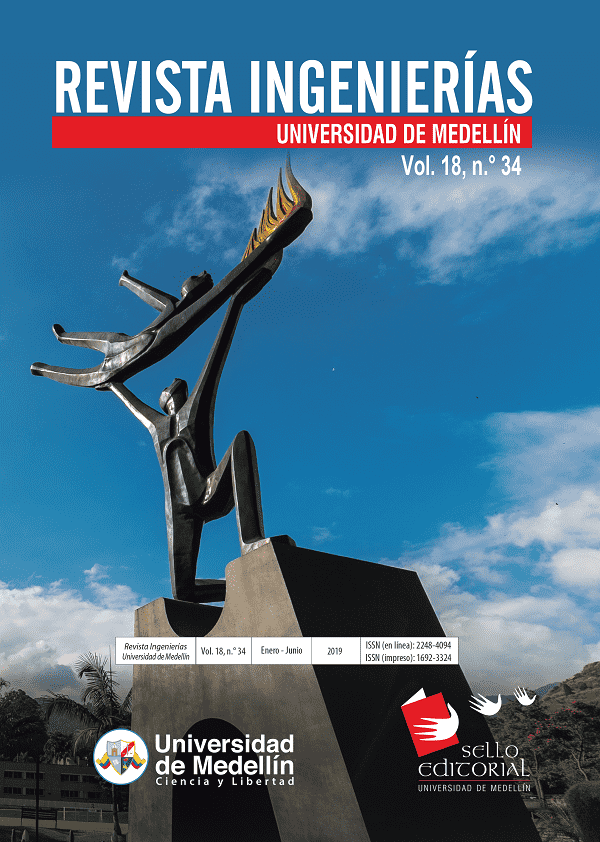Robust channel estimation for ultra-wide band communications
Main Article Content
Abstract
UWB (ultra-wide band) systems transmit low power signals through communication channels that operate in closed environments and in short distances resulting in multiple propagation trajectories. Moreover, the noise affecting these channels can be characterized by the use of statistical models with heavier tails that the ones exhibited by gaussian distribution. This article proposes a robust approach for the estimation of the parameters of UWB channels based on the weighted median. More specifically, it develops an algorithm of greedy search that exploits the low density characteristic of the channel’s impulsive response, in which the gains and delays of the relevant channels are determined by applying the weighted median on an scaled and displaced version of the signal received. This newly introduced algorithm is evaluated using extensive simulations in which the performance of the proposed algorithm surpasses the performance of the traditional greedy search algorithm for different levels of impulsive noise.
Article Details
References
[1] K. Siwiak, Ultraâ€Wideband Radio, Nueva York: John Wiley and Sons, 2004.
[2] A. Ritcher, et al., 'Maximum likelihood channel parameter estimation from multidimensional channel sounding measurements,' presentado en 2003 IEEE Vehicular Technology Conference, Orlando, 2003.
[3] S.F. Cotter y B.D. Rao, 'Sparse channel estimation via matching pursuit with application to equalization,' IEEE Transactions on Communications, vol. 50, n.° 3, pp. 374-377, 2002.
[4] M. Sharp y A. Scaglione, A., 'Estimation of sparse multipath channels,' presentado en Military Communications Conference, San Diego, 2008.
[5] J. Paredes et al., 'Ultra-wideband compressed sensing: Channel estimation,' IEEE Journal of Selected Topics in Signal Processing, vol. 1, n.° 3, pp. 383-395, 2007.
[6] H. El Ghannudi et al., 'α-stable interference modeling and Cauchy receiver for an IR-UWB ad hoc network,' IEEE Transactions on Communications, vol. 58, n.° 6, pp. 1748-1757, 2010.
[7] RC Qiu et al., (2005). 'Ultra-wideband for multiple access communications,' IEEE Communications Magazine, vol. 43, n.° 2, pp. 80-87, 2005.
[8] H. Arslan et al., Ultra wideband wireless communication, Nueva York: John Wiley and Sons, 2006.
[9] TK Liu et al., 'Compressed sensing maximum likelihood channel estimation for ultrawideband impulse radio,' presentado en IEEE International Conference on Communications, Dresden, 2009.
[10] FM Naini et al., 'Compressive sampling of pulse trains: Spread the Spectrum,' presentado en IEEE International Conference on Acoustics, Speech and Signal Processing, Taipei, 2009.
[11] V. Lottici et al., 'Channel estimation for ultra-wideband communications,' IEEE Journal on selected areas in communications, vol. 20, n.° 9, pp. 1638-1645, 2002.
[12] G. Gui et al., 'Sparse multipath channel estimation using compressive sampling matching pursuit algorithm,' presentado en IEEE Vehicular Technology Socety Asia Pacific Wireless Communications Simposium, Taiwan, 2010.
[13] B. S. Kim et al., 'A comparative analysis of optimum and suboptimum rake receivers in impulsive UWB environment' IEEE Transactions on Vehicular Technology, vol. 55, n.° 6, pp. 1797-1804, 2006.
[14] H. Hashemi, 'The indoor radio propagation channel' IEEE Journal on Selected Areas in Communications, vol. 11, n.° 7, pp. 943-968, 1993.
[15] J. Paredes y G. Arce, 'Compressive sensing signal reconstruction by weighted median regression estimates' IEEE Transactions on Signal Processing, vol. 59, n.° 6, pp. 2585-2601, 2011.
[16] J. Foerster, Ed., 'Channel modeling sub-committee report final,' IEEE P802. 15 Working Group for Wireless Personal Area Networks (WPANs), IEEE P802. 15-02/490r1-SG3a, 2003.
[17] J. Gonzalez et al., 'Zero-order statistics: a mathematical framework for the processing and characterization of very impulsive signals,' IEEE Transactions on Signal Processing, vol. 54, n.° 10, pp. 3839-3851, 2006.





